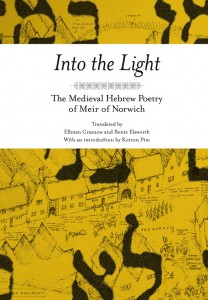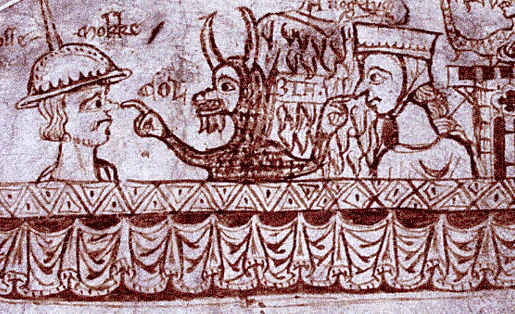REVIEW: Into the Light – The Medieval Hebrew Poetry of Meir of Norwich.
In 1290 a learned Jew in Norwich, Meir ben Eliahu, was expelled to the continent together with approx. 2000 other Jews. Around that time, he wrote a collection of poems imbued with a mixture of fear, anger, sorrow, hope – in short a concoction of all sorts of those emotions, which the Jewish community in England must have lived through, when they finally lost their livelihoods and homes after more than 200 years of anti-Semitic persecution.
For centuries the collection of poems was “hidden” in the Vatican until they were discovered in the middle of the 19th century. Until now only parts of this collection have been translated and thus made available to a wider audience. However, in a brand new edition we are treated to the Hebrew texts as well as an English translation of the poems accompanied by an introduction and partially annotated. In itself this is a feat and the editors and translators are to be congratulated.
The edition holds all the 22 poems of Meir from Norwich. (We know they were composed by him, because of his proclivity to embellish them with rather lengthy acrostics, carefully explained in the book by the translators.)

The collection opens up with a poem “On the Termination of the Sabbath”, which was set to a dancing tune. Then it continues with “A Liturgical Poem on the Burden of Exile, Suffering and Ruin” also called: “Put a curse on my enemy.” What is immediately apparent from the tile is that now we move towards the woes of Meir of Norwich and his friends and family stemming from the local racist harassment as well as that which was fed on the national level. Nonetheless one of the next poems: “Who is like you”, which is basically a poetic rendering of Genesis and Exodus holds (at least to me) one of the most moving stanzas. Following upon the expulsion from Paradise, Meir writes:
Forced away from where we dwelt
We go like cattle to the slaughter.
A slayer stands above us all.
We burn and die.
(Verse 55 -56, p. 58)
Obvious witness to an early holocaust, the words vibrate with pain and desperation, hardly contained; elsewhere the poet finds comfort in steadfast belief in how the luminous light of God will “irradiate our darkness with light”. Here, however, the tone is raw with pain, reminding us of the remains of the pitiful slayed Jewish family which were found in a well in Norwich, identified through their DNA and recently buried in the Jewish Cemetery in Norwich.

Remains of seventeen members of a slaughtered Jewish family found in a well in Norwich, were recently reburied in the Jewish cemetery
According to an introductory note a literal translation was first produced; after this a freer version was made. At the same time the translators have sought to preserve the essential meaning of the poems, while striving to “produce a text in English, which reads well.” Indeed, the translation does read well.
In this the translators have obviously succeeded. On the other hand the graphical layout is cumbersome. It is not apparent why it should be marred by the use of Latin ligatures. To be cool? Make it look at bit “Medieval”? Match the “otherness” of the Hebrew writing? Whatever the explanation, it disturbs the reading and thus to a certain extent mars the edition.
It is another – although minor quibble – that although at least some of the poems have obviously been woven together from quotations from the Hebrew Bible, only a few of those have been identified in the footnotes, even though many more may be found in the work of Einbinder, e.g. in her scholarly work on one of the poems (“Put a curse on my enemy”). Obviously the editors and translators have made a choice here, which however is not stated in the introduction. An unprepared reader may thus mistake the poems for something else than what they are – highly skilled and sometimes even beautiful heart-rendering textual patchworks steeped in the hebrew Bible as well as the the poetic traditions of Jewish Liturgical Poems from France, Germany and Spain.
Meir ben Eliahu was – if nothing else – obviously a very learned man!
Into the Light – The Medieval Hebrew Poetry of Meir of Norwich.
Translated by Ellmann Crasnow and Bente Elsworth. With an introduction by Keiron Oim.
East Publishing, Norwich 2013
Karen Schousboe
READ MORE:
Meir ben Elijah of Norwich: persecution and poetry among medieval English Jews.
By Susan B. Einbinder.
In: Journal of Medieval History Vol. 26, no. 2. Pp. 145 – 162
SOURCE OF PHOTO:
1233: A tax roll with a nasty tale to tell (E 401/1565– National Archives)
